Fringe media, pro-Kremlin Telegram channels, and online TV spread conspiracy theories about AstraZeneca’s Covishield vaccine
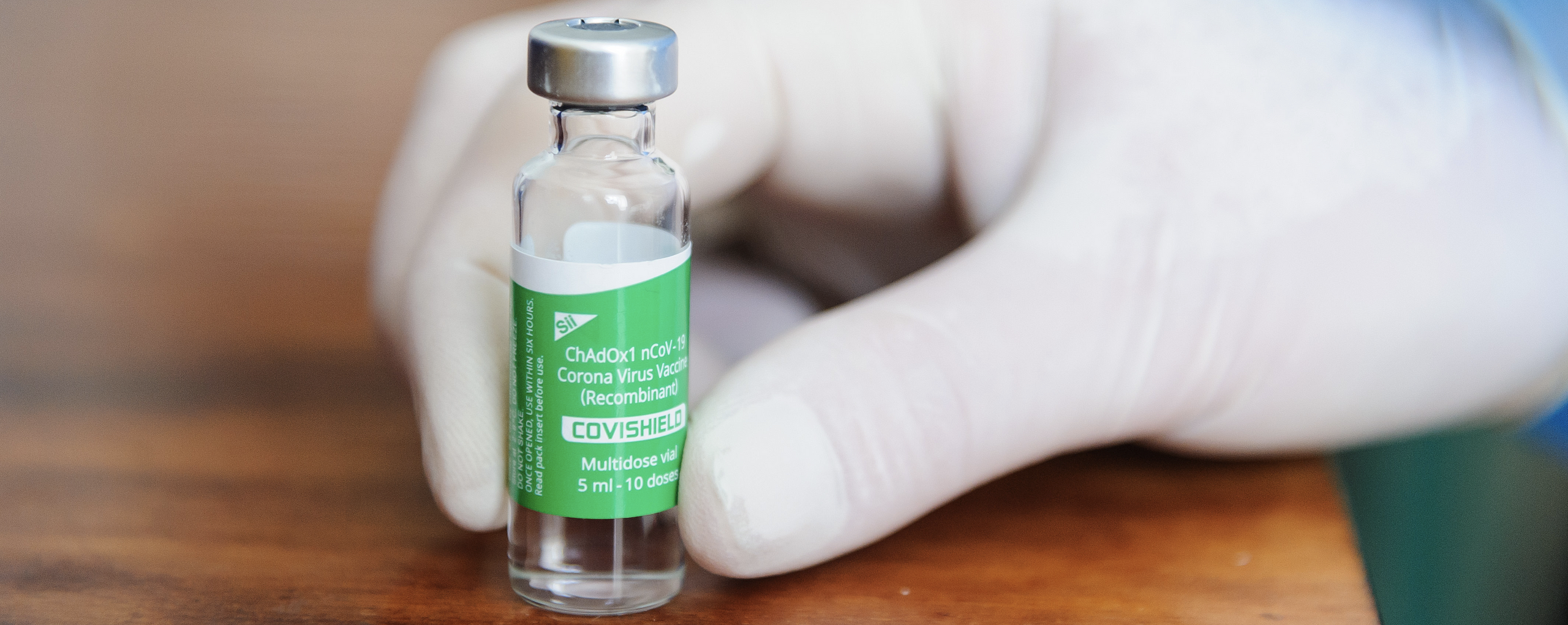
By Roman Osadchuk
Anonymous Telegram channels, Kremlin proxies, and political commentators attacked Ukraine’s vaccination effort by spreading mis- and disinformation about safety and conspiracy theories about the process. The claims spread across several platforms, amid what is already significant vaccine hesitancy in Ukraine.
According to a recent poll by Kharkiv Institute for Social Research for the Public Interest Journalism Lab, 47 percent of Ukrainians did not feel ready to vaccinate, while another survey by the Rating social research group reported that 57 percent of respondents said they would not vaccinate. The Ukraine vaccination effort kicked off with a barrage of criticism and conspiracy theories from various actors about the new vaccine, Covishield. Developed by Oxford University and British-Swedish company AstraZeneca, Covishield is being manufactured by the Serum Institute of India, the largest manufacturer of vaccines in the world. It was recently approved for use in Ukraine, though access has recently been curtailed in Germany, Canada, and elsewhere due to concerns over potential blood clots. The DFRLab has previously covered how pro-Kremlin outlets promoted anti-vaccine sentiment against Western-made vaccines, in particular.
“This vaccine is a low-quality brew”
On February 24, 2021, Ukraine started its vaccination drive, with the AstraZeneca Covishield vaccine serving as the central component of the effort. Ukraine received 500,000 doses of the vaccine after Maksim Stepanov, the country’s healthcare minister, visited India to personally observe the first shipment. A disinformation campaign on social media, however, began questioning the vaccine’s effectiveness. The DFRLab did not find a single point of origin of these attacks, but rather observed multiple groups participating in the effort to fuel vaccine hesitancy.
The most prevalent narrative on social media questioned the quality of the vaccine made by the Serum Institute of India. Multiple users and outlets referred to the Covishield vaccine as a “low-quality brew” that is still going through trials. The most significant post, in terms of online engagement, appeared on the personal Facebook page of Dmytro Vovnyanko, a writer and supporter of former president Poroshenko. In his post, Vovnyanko wrote that Ukraine would receive neither Pfizer, Moderna, nor AstraZeneca, but a “low-quality brew.” Vovnyanko’s claim was false, because Covishield is the brand name of the AstraZeneca vaccine. His post received 2,800 reactions and 1,300 shares, but earned a false information flag on Facebook and two fact–checks from local organizations that debunked his claims.
Multiple fringe websites copied this post and similar posts from various bloggers, disseminating them under clickbaity headlines, such as “Ukrainians instead will receive the cheapest Indian ‘brew’ instead of American vaccine.” This headline uses the word “instead” twice, and a user with the name “editor3” published the exact text on multiple pages. The odd phrasing indicates that articles and headlines were simply copied and pasted across all four websites. The identified article appeared on four websites connected via a Google Analytics ID, a unique identifier that allows the same people or entity to track activities of users on the website, according to DNSLytics, a reverse analytics tool.
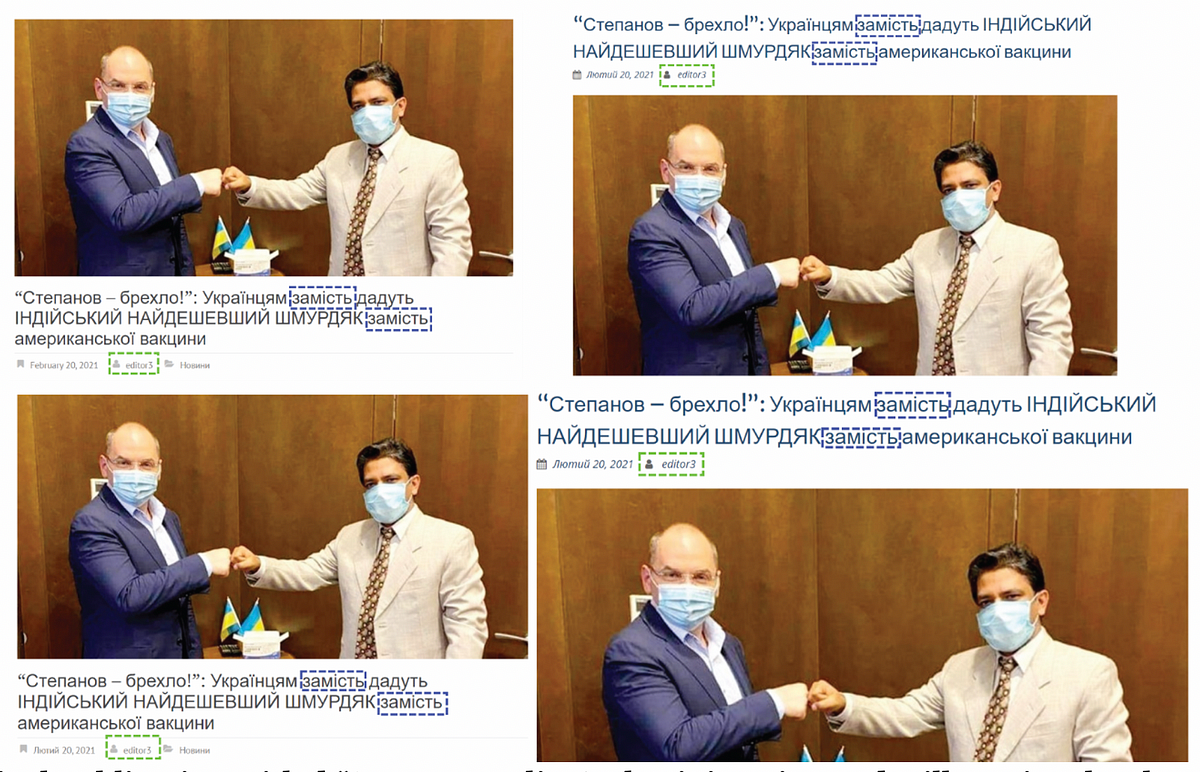
The people behind the websites published three “stories” out of four to different Facebook pages. All publications received low engagement, but appeared on pages with at least 220,000 followers.
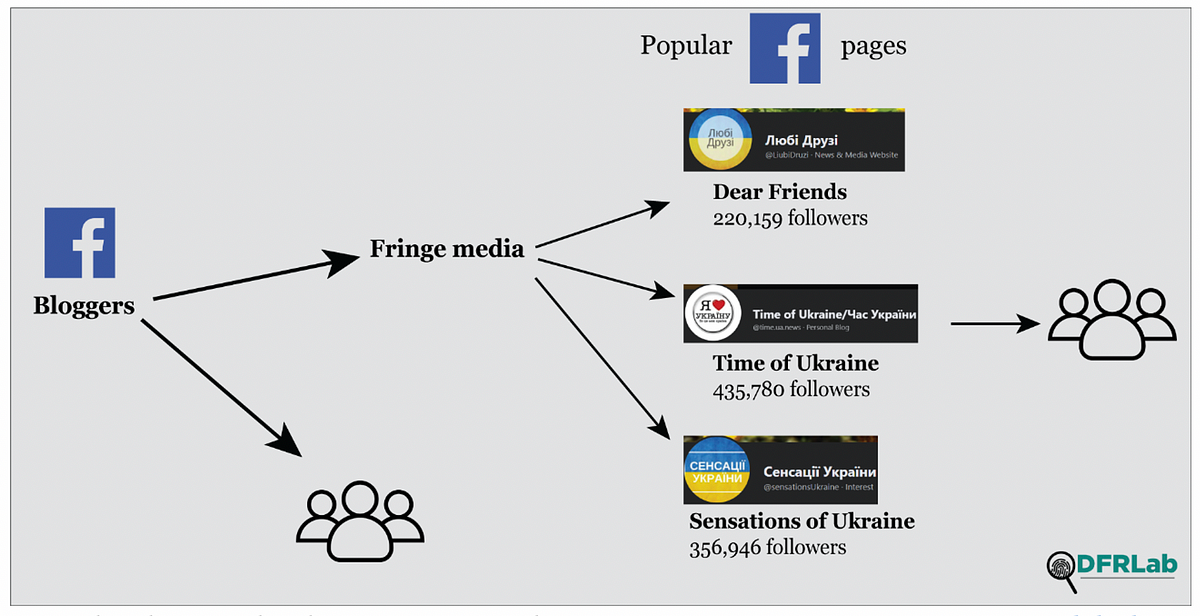
A recently banned pro-Russian TV channels in Ukraine, 112, promoted the same narrative in a YouTube video titled, “Vaccine or dangerous ‘brew:’ How does the government want to vaccinate Ukrainians?” As a source, a guest and a TV host appearing in the video cited a blog post by Serhii Kravchenko, himself a frequent guest on the channel. Kravchenko previously lobbied for the use of the Russian-made vaccine, Sputnik V.
On February 1, the Security Service of Ukraine exposed several Telegram channels as an intelligence network curated by Russian intelligence (GRU). These channels also spread disinformation aimed at the vaccination process. On February 25, the Legitimniy channel (175,765 subscribers) wrote under the hashtag “gossip” that the President’s Office instructed to call the vaccine “AstraZeneca” rather than “by its real name, Covishield,” in an effort to avoid the negative connotations attached to the “Covishield” name. On February 21, another channel, Spletnitsa (40,779 subscribers), wrote that the Minister of Health had agreed and will introduce a “cheap copy of AstraZeneca.”
Similar messages became so prominent on social media that even Melinda Simmons, U.K. Ambassador to Ukraine, stepped in, confirming that Covishield and AstraZeneca indeed refer to the same vaccine.
“The President and ministers will not get a Covishield shot; they got Pfizer jabs”
Another prevalent narrative in the public discourse was the unsupported claim that Ukrainian elites, notably public officials, had already been vaccinated with the Pfizer vaccine in December, and the live shots of them receiving the AstraZeneca Covishield vaccine in front of multiple cameras were simply staged. However, both the healthcare minister and President Zelensky received a jab of the Covishield vaccine in early March according to videos on their pages, as well as media reports.
The conspiracy theory’s origin is a baseless publication by Ukrainian businessman and public figure Mikhail Brodsky, who wrote on Obozrevatel, a media website that he owns, that top politicians were vaccinated with Pfizer on January 5, 2021. However, the story reemerged after the Ministry of Healthcare announced that Ukraine would receive the Covishield vaccine in the coming days.
One political blogger revived the narrative in February when Ukrainians discovered which vaccine will arrive in Ukraine. He wrote that Zelensky is ready to vaccinate people with “the brew,” but according to Telegram channels, elites have already bought Pfizer. The original post received 1,140 engagements, and one fringe media outlet picked it up and amplified it further.
The Telegram channels curated from Russian intelligence also chimed in on this narrative in late February. The Spletnitsa channel questioned the minister’s intent to get himself vaccinated with Covishield and forwarded its previous message on the “rumor” that public officials will get injected with glucose instead of the vaccine in front of the camera. Legitimniy wrote that the political elite would not take the Covishield shot and instead wait for Pfizer, leaving “the cheap Indian replica for poor people.”
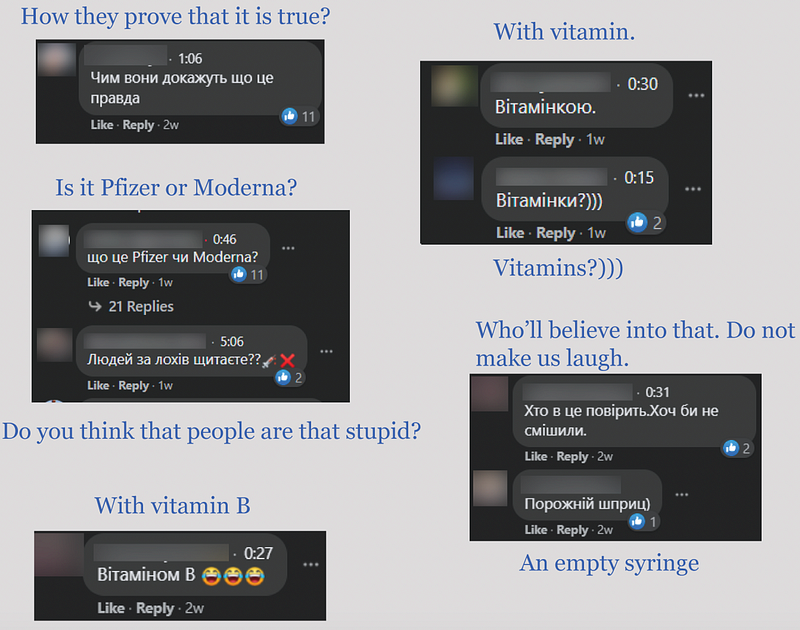
Simultaneously, multiple accounts supported the narrative by commenting under the Ministry of Health’s posts and videos, casting doubt on the authenticity of the video. Some of these accounts were anonymous, having only a profile picture with zero other public activity, suggesting that they may have been inauthentic.
“Ukraine is poisoning its military to raise vaccination statistics”
Another narrative emerged from the police force of the self-styled Luhansk People’s Republic in Eastern Ukraine , and claimed that the Ukrainian army experienced casualties as a result of vaccinations on February 27. The message falsely claimed that Ukrainian soldiers died after receiving the vaccine, a claim that was not corroborated by any official Ukrainian sources. Multiple VK pages and blogs amplified the unsupported claim. Similar messages appeared on the same platform, claiming that Ukrainians will be the “guinea pigs” for the unproven vaccine. DFRLab has previously researched similar sockpuppet activity targeting the Ukrainian military, and the actors behind the operation also shared their narratives to groups dedicated to local and regional news in Eastern Ukraine.
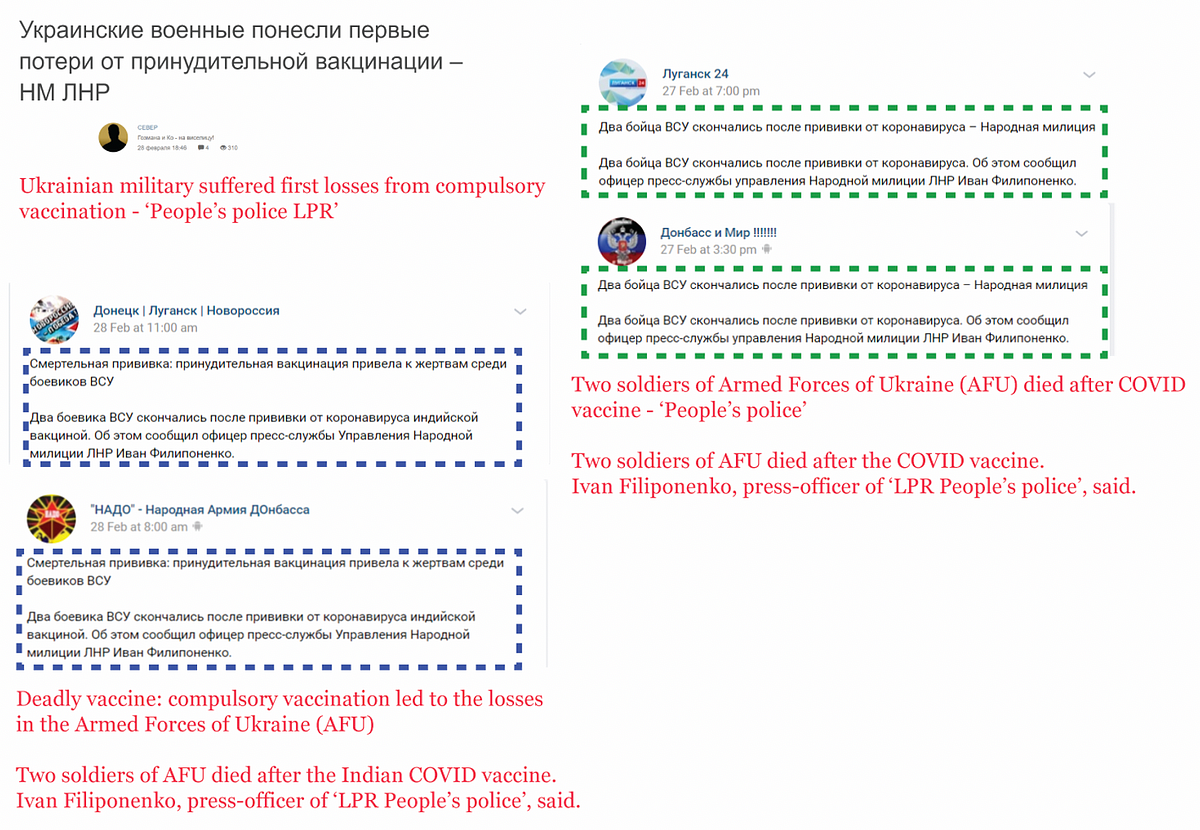
The next day, Telegram channel Resident (120,156 subscribers), identified by the SBU as GRU-led, published “‘insider information” claiming that the President’s Office had sent 50,000 vaccine doses to the armed forces, forcing military personnel to take the vaccine in order to boost the overall vaccination rate in the country. More than 128,000 people viewed this post from the original source, and multiple channels forwarded it, including Legitimniy and Kremlin-owned Ukraina.ru channel, so the actual number of views is likely higher.
The vaccination rollout in Ukraine has not been perfect: multiple journalists raised credible criticism of flaws in the procurement and registration processes, while the testing of AstraZeneca’s vaccine has experienced ongoing controversy. Alongside these genuine criticisms, however, some actors attacked the Covishield vaccine’s quality based on false or information, as well as conspiracy theories. These attacks risk fueling vaccine hesitancy regarding the Covishield vaccine in Ukraine and undermine public health if left unchecked.
Roman Osadchuk is a Research Assistant, Eurasia, with the Digital Forensic Research Lab.
Cite this case study:
Roman Osadchuk, “Multiple actors attack Ukrainian COVID-19 vaccination efforts,” Digital Forensic Research Lab (DFRLab), March 24, 2021, https://medium.com/@DFRLab/multiple-actors-attack-ukrainian-covid-19-vaccination-efforts-7da22d9e8c4a.
Follow along for more in-depth analysis from our #DigitalSherlocks.

